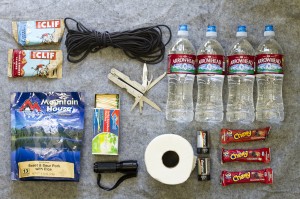
Many people wonder, in the event of a major crisis, if college students could survive and make it through. The good news is, BYU students could likely survive a food shortage with the right instruction.
The United Nations predicted and warned of an impending food crisis in 2013. According to the UN, unpredictable weather, including drought in the United States, could result in a worldwide food crisis, and extreme weather patterns and natural disasters around the world could have damaging repercussions in the United States. With minor education, however, BYU students can ensure they will stay fed.
With an increasing global population, the world is not producing enough grain, the UN reported. This, together with any complications caused by natural disasters, could result in a limited and uncertain food supply.
For some Provo residents, the quest for nourishment is already an ongoing battle, regardless of external conditions.
Gordon Turner has been without permanent housing since 1995. A series of trials left him unable to provide for himself, meaning there is no guarantee that he will eat every day.
“A lot of times I rely on the food and care coalition,” Turner said. “They’re a state-funded program for food, and they help with eyeglasses and teeth and stuff like that.”
At other times, Turner relies on contributions from passersby in Provo.
“I struggle,” he said. “But I come out pretty good in the end. I have a good attitude no matter what.”
Other Provo residents are more fortunate and have access to ongoing resources.
Blair Camp is the emergency manager at BYU Risk Management. Camp somewhat debunked the myth that BYU has extensive food storage in case of emergency.
“There is not a single food storage warehouse; rather, there is food already on campus from the Cougareat, Cannon Center and Creameries,” he said.
According to Camp, there is a limited amount of food available to students in time of need.
“BYU does have food supplies in quantities that will sustain life for about three days, depending on the number of students on the campus at the time,” Camp said.
With a limited food supply, BYU does not encourage students to rely on the university for sustenance in the event of a disaster.
“Once again, BYU stresses the counsel of our Church leaders for self-reliance through individual and family emergency kits to sustain life for the first 72 hours,” Camp said.
After emergency food resources have been depleted, there are other resources capable of supporting life — the natural surroundings.
Kelly Magleby is a wilderness survivalist who has worked for survival schools in Utah and Arizona. Magleby said she is sure people could survive solely off of the land indefinitely if a food shortage were to hit Utah.
“You can survive off of cattail, and there is quite a lot of that all over Utah,” Magleby said. “You can also dig down and gather the roots. You can dry it and use that as a flour. People make bread out of that.
“Another resource would be acorns,” she added. “There is a ton of scrub oak and big oak trees in Utah, and certain times of the year you can gather tons of acorns, like in the fall.”
Acorns are naturally bitter, but by a process called leaching the nuts become less tart.
“Leaching is when you soak it in water and keep changing the water,” Magleby said. “That draws out all of the tannins, the stuff that makes it bitter. If you do that enough times, it becomes something that you can actually eat.”
Magleby, however, said she would not want to rely solely on these wild edibles.
“If you had to live in the wild, I think that your best bet would be to learn how to fish and hunt,” she said. “You would want to learn how to catch rabbits and bigger game like deer to support you through the year. The wild edibles would be supplemental.”
There are also more extreme ways to maximize the chances of survival in any condition.
Utah is home to a group of “preppers,” as they call themselves. The Utah Preppers make preparations in case of natural disaster or other drastic circumstances. CNN featured one Utah prepper named Peter Larson. Larsen fears civil unrest and has consequently made preparations.
“There will be a nuclear holocaust,” Larson said in the interview. “Someone will pull the pin … We feel like these are the last days. There will be some hard times.”
Preppers around the country combine wilderness survival skills and emergency preparedness. Some of these individuals have tools and food that could sustain life for months at a time.
Though BYU students aren’t encouraged to take as extreme measures as preppers, the future is unpredictable. Despite any food-related difficulties that could fall upon the United States, there are many ways for one to keep on keeping on in the Beehive State. Becoming educated about available resources can be the difference between life and death.




